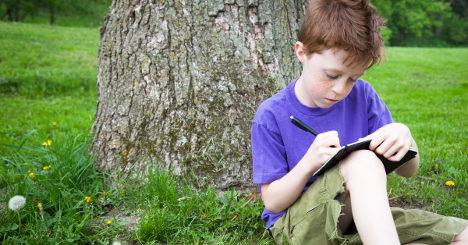Why Kids Should Nature Journal at All Grade Levels: 7 Powerful Benefits

Nature Journal at All Grade Levels: 7 Powerful Benefits
Nature Journal at All Grade Levels: 7 Powerful Benefits
Nature Journal at All Grade Levels: 7 Powerful Benefits
Nature Journal at All Grade Levels: 7 Powerful Benefits
Introduction
In an increasingly digital world, the practice of nature journaling offers a refreshing and impactful way for kids to connect with their environment. Nature journaling—the practice of recording observations, thoughts, and reflections about the natural world—has profound educational and personal benefits for children of all ages. This article explores why kids should nature journal at all grade levels, highlighting the advantages that span cognitive development, emotional well-being, and academic performance.
What is Nature Journaling?
Nature journaling involves creating a personal record of observations about nature, including plants, animals, weather, and landscapes. This can be done through writing, drawing, or a combination of both. The practice encourages kids to engage with their surroundings, enhancing their observation skills and fostering a deeper appreciation for the natural world.
Cognitive Benefits of Nature Journaling
Enhances Observation Skills
Nature journaling requires keen observation, helping kids to notice details they might otherwise overlook. This practice sharpens their ability to focus, which is beneficial in both academic and everyday settings.
Promotes Critical Thinking
When children document their observations, they often question what they see, leading to deeper investigation and critical thinking. For example, a child might wonder why certain plants grow in one area and not another, prompting research and analysis.
Emotional and Psychological Benefits
Reduces Stress and Anxiety
Spending time in nature and reflecting on its beauty can have a calming effect on children. Nature journaling allows kids to express their thoughts and feelings, providing a therapeutic outlet that reduces stress and anxiety.
Enhances Emotional Intelligence
By observing and reflecting on the natural world, children develop greater empathy and understanding. This enhanced emotional intelligence can improve their interactions with others and their ability to manage their own emotions.
Academic Benefits
Boosts Creativity
Nature journaling encourages creative expression through writing and drawing. This can translate into improved performance in subjects like art and literature, where creativity is key.
Supports STEM Learning
Recording observations about plants, animals, and ecosystems can spark an interest in science, technology, engineering, and mathematics (STEM). Kids learn to apply scientific principles and methodologies, enhancing their academic performance in these areas.

Social and Environmental Awareness
Fosters Environmental Stewardship
Nature journaling helps children develop a personal connection to the environment. This connection fosters a sense of responsibility and a desire to protect the natural world, promoting lifelong environmental stewardship.
Encourages Community Engagement
Kids who nature journal often share their findings with peers, teachers, and family members, fostering a sense of community. This sharing can lead to collaborative projects and initiatives that benefit the local environment.
Practical Tips for Implementing Nature Journaling
Getting Started
- Materials Needed: A notebook or journal, pencils, colored pencils, or watercolors.
- Choosing a Location: Parks, gardens, or even a backyard can serve as excellent locations for nature journaling.
- Frequency: Encourage regular journaling, whether daily, weekly, or based on specific projects.
Guiding Questions
- What do you see, hear, and smell?
- How does the weather affect the environment today?
- What changes do you notice over time?
Activities for Different Grade Levels
Elementary School:
- Simple drawings and short descriptions of plants and animals.
- Basic weather observations and seasonal changes.
Middle School:
- Detailed sketches and more complex descriptions.
- Investigations into ecological relationships and biodiversity.
High School:
- In-depth research projects based on observations.
- Analysis of environmental issues and potential solutions.
Overcoming Challenges
Addressing Resistance
Some kids may initially resist nature journaling, especially if they are accustomed to digital activities. To overcome this, integrate technology by allowing them to use tablets for drawing or taking notes before transferring their work to a physical journal.
Providing Support
Teachers and parents should provide guidance and encouragement, helping children to develop their skills and find joy in the process.

Conclusion
Nature journaling is a powerful tool that benefits kids at all grade levels. It enhances cognitive skills, promotes emotional well-being, boosts academic performance, and fosters a deep connection to the environment. By incorporating nature journaling into their routine, children can develop valuable skills and a lifelong appreciation for the natural world.
FAQs
Q: What age is best to start nature journaling?
A: Children can begin nature journaling at any age. Simple observations and drawings can start as early as preschool, with complexity increasing as they grow.
Q: How often should children nature journal?
A: Regular journaling is ideal. Aim for at least once a week to maintain engagement and track changes over time.
Q: Can nature journaling be done in urban areas?
A: Yes, nature journaling can be done anywhere. Urban areas offer unique opportunities to observe different types of plants and animals.
Q: How can technology be integrated with nature journaling?
A: Technology can enhance nature journaling by allowing kids to take photos, record sounds, or use drawing apps before transferring their observations to a physical journal.
[bdp_post_carousel show_tags="false" show_comments="false" show_category="false" dots="false" limit="10" orderby="rand"]
You can signup for free
